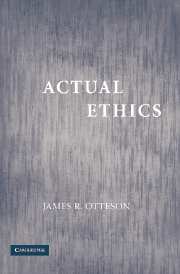Book contents
- Frontmatter
- Contents
- Acknowledgments
- Preface
- PART I WORKING OUT THE POSITION
- 1 Personhood and Judgment
- 2 A Matter of Principle, Part One: The Betrayal of Personhood
- 3 A Matter of Principle, Part Two: Personhood Writ Large
- 4 The Demands of Poverty
- 5 The Wealth of Nations
- PART II APPLYING THE PRINCIPLES
- PART III THE END
- Index
- References
1 - Personhood and Judgment
Published online by Cambridge University Press: 17 November 2009
- Frontmatter
- Contents
- Acknowledgments
- Preface
- PART I WORKING OUT THE POSITION
- 1 Personhood and Judgment
- 2 A Matter of Principle, Part One: The Betrayal of Personhood
- 3 A Matter of Principle, Part Two: Personhood Writ Large
- 4 The Demands of Poverty
- 5 The Wealth of Nations
- PART II APPLYING THE PRINCIPLES
- PART III THE END
- Index
- References
Summary
HUMANITY: PERSONS, PLACES, AND THINGS
To be human is to think and to imagine, to express one's thoughts and imaginings, and to make decisions and take actions based on one's thoughts and imaginings. Although there are exceptions to this, exceptions we discuss below, still the conception of human nature as characterized by a rich mental life and the ability to contemplate and act on that mental life captures the heart of it.
However persuasively some have argued that human beings are only marginally different from other animals, G. K. Chesterton was right that the cave paintings in southern France refute them decisively. Those images were painted deep inside many different dark caves tens of thousands of years ago, then were forgotten for thousands of years, before they were found again only recently. The images are primitive, as one would expect, but they are nonetheless unmistakable in their portrayals of bears, bison, mammoths, panthers, rhinoceroses, ibexes, hyenas, horses, insects, owls, aurochs, and other animals, not to mention men, women, and children—in short, many of the most important parts of those humans' everyday experience. In addition to paintings, there are engravings, carvings, stencils, and finger tracings. We do not know for sure who made them or why, or exactly why they were put just where they were, but the images are able to reach across the millennia and to communicate clear and obvious meaning to us. Indeed, their expressive power is almost haunting.
- Type
- Chapter
- Information
- Actual Ethics , pp. 3 - 44Publisher: Cambridge University PressPrint publication year: 2006



